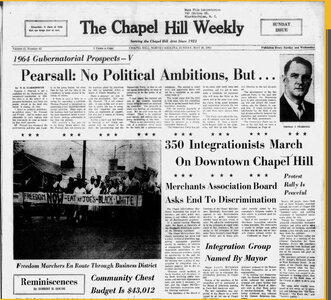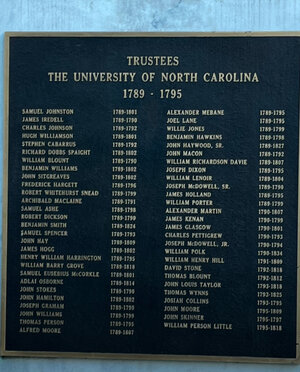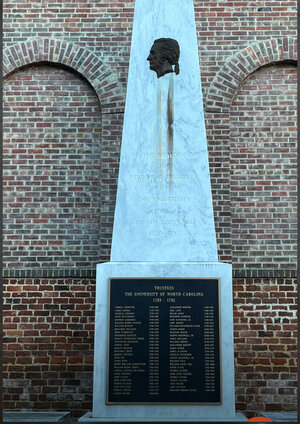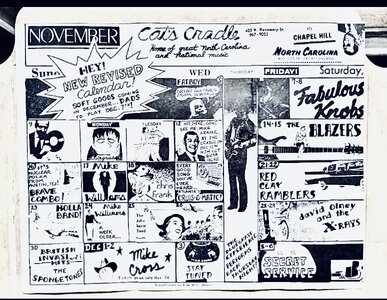From Edwin Yoder i
"Edwin Milton Yoder Jr. was born on July 18, 1934. He was educated at the
University of North Carolina at Chapel Hill, graduating in English in 1956. Yoder then won a
Rhodes Scholarship to
Jesus College, Oxford, and studied
Philosophy, Politics and Economics from 1956 to 1958.> While at Oxford, Yoder was a member of the
Oxford University basketball team with teammates
Willie Morris and
Paul Sarbanes. He was then an editorial writer for various newspapers including the
Charlotte News, the
Greensboro Daily News and the
Washington Star. During his time at the
Washington Star, he won the
Pulitzer Prize for Editorial Writing in 1979. He was a columnist on
The Washington Post from 1982. In 1992, he was appointed Professor of Humanities at
Washington and Lee University. He was elected to an Honorary
Fellowship of Jesus College, Oxford, in 1998. He died in
Chapel Hill, North Carolina, on November 30, 2023, at the age of 89."
FROM SEPTEMBER, 1975
"Southern Liberalism
by
Our Readers
To the Editor:
I was both impressed and intrigued by Michael Novak’s article, “Tom Wicker’s Attica” [May]. I have not yet read
A Time To Die, and can neither endorse nor question the severity of his judgment upon it. I suspect that it is not unwarranted.
Tom Wicker is an old and admired friend of mine; but I am often puzzled—and sometimes, I admit, irritated—by his tendency to mar otherwise penetrating and generous comment (I think, for instance, of his tributes to the constitutional conservatism of Sam Ervin, Jr.) by hat-tipping to conventional Yankee liberals. He does seem to obey, occasionally, a mysterious compulsion not merely to let his opinions speak on their merits, but to establish his bona fides with certain non-Southerners to whom he might, on account of his regional origins, be suspect.
The main point of this letter, however, is to urge Mr. Novak to deepen his perception of Southern liberalism, so-called. He writes, for instance, that “it is characteristic of Southern liberals that they have come late to liberal attitudes on race . . . [and] usually, they can date to the day and hour the first time they touched a black, embraced a black, etc.” Not so, I think. This may be peculiarly true of Tom Wicker. For my part, I have lived on intimate (if initially paternalistic) terms with blacks since early childhood; and I regard my views, such as they are, as forming a continuum of consciousness. I also regard them, by the way, as having little to do with political correctness or fashion and much to do with the decencies of human behavior to which our best religious and political traditions enjoin us. I think Mr. Novak would be told essentially the same thing by hundreds of sentient Southerners whose views on race are “liberal” as the world judges such things, but who have not felt sufficiently guilt-stricken to commerce with or sentimentalize the “revolutionary theater” that, in Mr. Novak’s view, preempted Tom Wicker’s good judgment at Attica.
Indeed, Mr. Novak lumps together people like Willie Morris and Ramsey Clark, along with Wicker, although to my mind there is no discernible resemblance between Willie Morris’s historically-minded and fine-textured perceptions of blacks and the more shallow, conventional, and defensive attitudes which Mr. Novak attributes to the “Southern liberal” as a type.
I urge Mr. Novak to reexamine the finer pages of Morris’s
North Toward Home and
Yazoo, as well as C. Vann Woodward’s relevant essays, and see if he does not find there a searching honesty, a dry light, that bears little likeness to the conventional liberal-chic he rightly deplores. By the same token, there are worlds of difference between, say, Vernon Jordan and Jesse Jackson—although both are indeed Southerners.
It was until quite recently assumed by many non-Southerners that the South is monolithic, while in fact it is a mosaic of distinguishable attitudes and political subcultures; and it is regrettable that a writer of Mr. Novak’s quality and standards should reinforce, anew, the myth that Southerners (even Southern liberals) are all alike. Otherwise, his observations seem to me both timely and penetrating; and I suspect they will have a profound effect on us all.
Edwin M. Yoder, Jr.
Greensboro, North Carolina"
To the Editor: I was both impressed and intrigued by Michael Novak's article, “Tom Wicker's Attica” . I have not yet read A Time To Die, and can neither endorse

www.commentary.org










